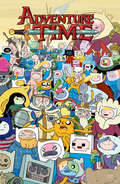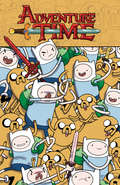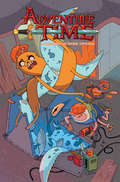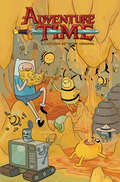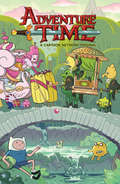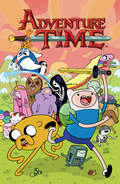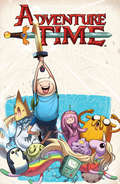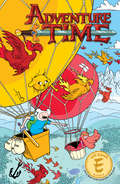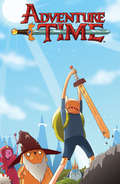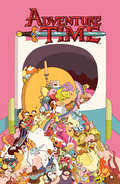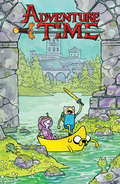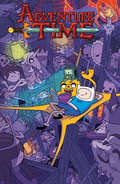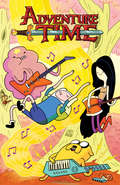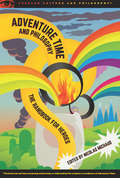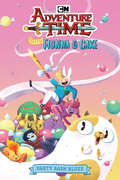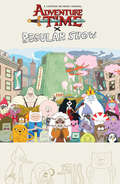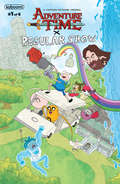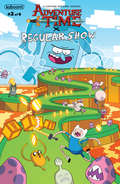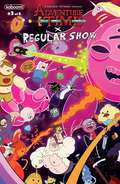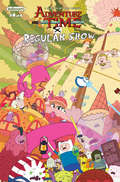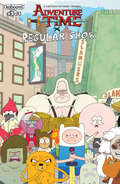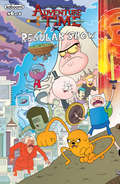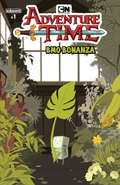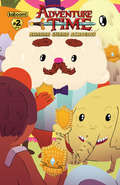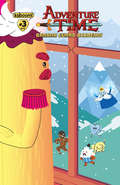- Table View
- List View
Adventure Time Volume 11 (Planet of the Apes #50 - 53)
by Pendleton Ward<p>Jake just wants to have a nice relaxing weekend without any adventures. Not too much to ask for, right? Too bad the Governor of Ghost-A- Rica has plans of his own and that means releasing his ghost minions to steal the youth of all the citizens in Ooo. It's a battle for youth, literally! Collects issues 50-53. <p>This is a fixed-format ebook, which preserves the design and layout of the original print book.</p>
Adventure Time Volume 12 (Planet of the Apes #54 - 57)
by Pendleton Ward<p>Finn and Jake wake up in a bizarre world inside of BMO, and it looks like BMO is determined to give them the best game of their lives! Collects issues 54-57. <p>This is a fixed-format ebook, which preserves the design and layout of the original print book.</p>
Adventure Time Volume 13 (Planet of the Apes #58 - 61)
by Pendleton Ward<p>When old friends and enemies sudden make a resurgence in Ooo, Finn and Jake know that something is about to go down... Between building their own dungeon and saving the world, the heroes might be stretched too thin. If they can't save the day, then who can? Collects issues 58-61. <p>This is a fixed-format ebook, which preserves the design and layout of the original print book.</p>
Adventure Time Volume 14 (Planet of the Apes #62 - 65)
by Mariko Tamaki Maarta Laiho Ian McGinty<p>The competition for Best Princess Ever is in full swing! As Lumpy Space Princess, Fire Princess, Muscle Princess, and more compete for the title, it’s discovered that someone is sabotaging the games. With Finn and Jake on the case, Princess Bubblegum will have to keep the show going until they can track down the true culprit and save the day. Written by The New York Times bestselling author Mariko Tamaki (This One Summer) and illustrated by Ian McGinty. Collects issues 62-65. <p>This is a fixed-format ebook, which preserves the design and layout of the original print book.</p>
Adventure Time Volume 15 (Planet of the Apes #66 - 69)
by Delilah S. Dawson Maarta Laiho Ian McGinty Pendleton Ward<p>Join Princess Bubblegum, Marceline, and LSP as they take on Finn, Jake, and BMO in a hot air balloon race around the land as they try to see who can gather up the three pieces of gold that will get them their ultimate prize. Collects issues 66-69. <p>This is a fixed-format ebook, which preserves the design and layout of the original print book.</p>
Adventure Time Volume 2: Sugary Shorts Mathematical Edition (Planet of the Apes #5 - 9)
by Pendleton Ward<p>Join Finn the Human, Jake the Dog, and Princess Bubblegum for all-new adventures in The Land of Ooo. Experience the algebraic adventures with your favorite characters like Marceline the Vampire Queen, Lumpy Space Princess, Ice King, Peppermint Butler, and so many more. Not only does this graphic novel collect the out-of-control, adventure-packed third story arc, it also includes the unforgettable "Choose Your Own Adventure" story. Collecting issues 5-9 of the smash hit ADVENTURE TIME comics series by Ryan North, Shelli Paroline and Braden Lamb! <p>This is a fixed-format ebook, which preserves the design and layout of the original print book.</p> <P><P> <i>Advisory: Bookshare has learned that this book offers only partial accessibility. We have kept it in the collection because it is useful for some of our members. Benetech is actively working on projects to improve accessibility issues such as these.</i>
Adventure Time Volume 3 (Planet of the Apes #10 - 14)
by Pendleton Ward<p>The all-ages hit of the year is back with a new volume collecting even more algebraic adventures! What happens when Jake the dog and Finn the human get a hold of Princess Bubblegum's time machine and travel into the future? Can you say ROBOT FINN & JAKE? Find out more in this exciting volume! Collecting issues 10-14 of the smash hit ADVENTURE TIME comics series by Ryan North, Shelli Paroline and Braden Lamb! <p>This is a fixed-format ebook, which preserves the design and layout of the original print book.</p>
Adventure Time Volume 4 (Planet of the Apes #15 - 19)
by Pendleton Ward<p>Join best pals Jake the Dog, Finn the Human, and... the ICE KING?! It's a DUNGEON BROVENTURE as this crazy trio jumps into a game of danger of feelings! Will the treasure at the end be worth all the crazy emotions, or have Finn and Jake finally found a quest they won't be able to finish? Collecting issues 15-19 of the smash hit ADVENTURE TIME comics series by Ryan North, Shelli Paroline and Braden Lamb! <p>This is a fixed-format ebook, which preserves the design and layout of the original print book.</p>
Adventure Time Volume 5 (Planet of the Apes #20 - 24)
by Pendleton Ward<p>Princess Bubblegum only wants what is best for her kingdom, most of the time. After an experiment of hers goes wrong, Ooo is under attack and this time, Finn and Jake won't be able to help. Princess Bubblegum must stand up and fight her own creation, but with the help of Marceline and?Lemongrab? It shouldn't be too hard to save the day, right? Collecting issues 20-24 of the smash hit ADVENTURE TIME comics series by Ryan North, Shelli Paroline and Braden Lamb! <p>This is a fixed-format ebook, which preserves the design and layout of the original print book.</p>
Adventure Time Volume 6 (Planet of the Apes #25 - 29)
by Pendleton Ward<p>The Candy Kingdom is a ghost town! Finn and Jake finally get to have the ultimate out-of-body experience-LITERALLY. It's a new day in Ooo when its greatest heroes find themselves wandering the Earth as bewildered ghosts! Don't miss these brand-new adventures written by acclaimed cartoonist Ryan North (Dinosaur Comics) and illustrated by indie superstar Jim Rugg (Wayward)! Also featuring the all-star comic talent of Dustin Nguyen (Batman: Li'l Gotham), Jeffrey Brown (Darth Vader and Son), Jess Fink (Kid With Experience), with Shelli Paroline and Braden Lamb (Adventure Time, The Midas Flesh) as they take on the story of Carl the Gem, and the history of Ooo through his eyes. Collects issues 25-29. <p>This is a fixed-format ebook, which preserves the design and layout of the original print book.</p>
Adventure Time Volume 7 (Planet of the Apes #30 - 34)
by Pendleton WardFinn is about to fall head-first into an adventure so intense, he'll never remember it! Finn tries to take on the Mnemonoid only to wake up in the future with no recollection what has happened in the time jump! With his pals Jake, Princess Bubblegum, and Marceline, Finn must remember how to beat this mean dude before he forgets everything else! Collects issues 30-34.
Adventure Time Volume 8 (Planet of the Apes #35 - 39)
by Pendleton Ward<p>It's the end of one era and the beginning of another in this collection that includes the very the last issue by Ryan North and artists Shelli & Braden as they take the AT gang on one last one-shot adventure, and introduces indie all-stars Christopher Hastings and Zachary Sterling as they start Finn and Jake on an adventure that is as tasty as it is dangerous! Collects issues 35-39. <p>This is a fixed-format ebook, which preserves the design and layout of the original print book.</p>
Adventure Time Volume 9 (Planet of the Apes #40 - 44)
by Pendleton WardFinn and Jake find themselves in the middle of a secret war when they inaverdantly take out Peppermint Butler's secret agent Candy Bar! There is something going on with the King of Ooo and the weird bears that he's hanging out with and it's up to Finn and Jake to get to the bottom of the King's dastardly plot! ...if only they weren't being accused of treason in the process. Collects issues 40-44. <p>This is a fixed-format ebook, which preserves the design and layout of the original print book.</p>
Adventure Time and Philosophy
by Nicolas MichaudAdventure Time and Philosophy is a monster-beating, wild ride of philosophical mayhem. The authors have come together to understand and explore one of the deepest and most thoughtful television shows ever to assault human brain waves. Where Adventure Time shows us what the world could be like, this book screws open our cranial lids, mucks about in the mess that is our heads, and attempts to come to some answers about the nature of reality. Adventure Time challenges everything we know about life, meaning, heroism, and even burritos. And it's time to give the show some serious thought. Adventure Time and Philosophy is a chance to put down your broadsword, put your exhausted monster-slaying feet up, and try to figure out why you spend your time rescuing people in distress and fighting for justice. What is justice anyway? If you don't happen to have your pocket edition of the Enchiridion on hand, and Billy the Hero *wicked guitar solo* hasn't been returning your calls, pick up Adventure Time and Philosophy and learn what it means to be a real hero! The authors of the chapters will prove that Adventure Time is much more than a cartoon, it's a way of life. . . . It's also the future!--a post-apocalyptic future 10,000 years after the Great Mushroom War, actually. Who better to have as companions than Finn and Jake when taking on Plato, Nietzsche, and Baudrillard or encountering the Slime Princess, the Ice King, and Marceline the Vampire Queen. In a review of the show in Entertainment Weekly, Darren Franich characterized Adventure Time as a "hybrid sci-fi/fantasy/horror/musical/fairy tale, with echoes of Calvin and Hobbes, Hayao Miyazaki, Final Fantasy, Richard Linklater, Where the Wild Things Are, and the music video you made with your high school garage band." This book is filled with chapters written by a colorful cast of characters who enlighten us about the profound and life-affirming spiritual subtext and dark comedic elements of an awesomely fantastic show.
Adventure Time with Fionna & Cake Original Graphic Novel: Party Bash Blues (Adventure Time)
by Pendleton Ward Kate SheridanIt’s a very special day in the Land of Ooo: Fionna the Human’s birthday! To surprise her, Prince Gumball and Marshall Lee have Cake distract Fionna with an adventure as they prepare the biggest surprise party in history. But when Prince Gumball’s experimental serum turns Fionna’s birthday cake into a monster, everyone must work together to save the Candy Kingdom...and maybe a friendship, too! Join writer Kate Sheridan (Fallow Time) and artist Vivian Ng (Nickelodeon The Legend of Korra - Turf Wars) on a brand-new adventure in the incredible world of Cartoon Network’s Adventure Time. <P><P> <i>Advisory: Bookshare has learned that this book offers only partial accessibility. We have kept it in the collection because it is useful for some of our members. Benetech is actively working on projects to improve accessibility issues such as these.</i>
Adventure Time/Regular Show (Adventure Time/Regular Show #1 - 6)
by Conor McCreery Mattia Di Meo<p>Harvey and Joe Shuster Award-nominated writer Conor McCreery (Kill Shakespeare) and newcomer illustrator Mattia di Meo present a crossover for the ages in this mash-up of two of our favorite Cartoon Network shows! When a powerful new villain threatens to conquer Adventure Time’s Ooo, Princess Bubblegum sends Finn and Jake on a desperate quest to find The Power that can save the land—a power that Skips from Regular Show just happens to be hiding! Finn and Jake’s arrival only exacerbates an existing tension between Mordecai and Rigby, and the trip back to Ooo threatens to tear two sets of bros apart…forever. Collects the complete limited series #1-6. <p>This is a fixed-format ebook, which preserves the design and layout of the original print book.</p>
Adventure Time/Regular Show (Adventure Time/Regular Show #1)
by Conor McCreery Mattia Di Meo<p>It's a crossover for the ages in this mash-up of two of our favorite Cartoon Network shows! When a powerful new villain threatens to conquer Adventure Time's Ooo, Princess Bubblegum sends Finn and Jake on a desperate quest to find The Power that can save the land—a power that Skips from Regular Show just happens to be hiding! Finn and Jake's arrival only exacerbates an existing tension between Mordecai and Rigby, and the trip back to Ooo threatens to tear two sets of bros apart forever. <p>This is a fixed-format ebook, which preserves the design and layout of the original print book.</p>
Adventure Time/Regular Show (Adventure Time/Regular Show #2)
by Conor McCreery Mattia Di Meo<p>After escaping the attacks on the Candy Kingdom, Finn and Jake are in a totally not mathematical face-off with Mordecai and Rigby. <p>This is a fixed-format ebook, which preserves the design and layout of the original print book.</p>
Adventure Time/Regular Show (Adventure Time/Regular Show #3)
by Conor McCreery Mattia Di Meo<p>With both of their broships on the line, Mordecai and Finn team up while Rigby and Jake go their own way. Will they be able to find the power before it's too late? <p>This is a fixed-format ebook, which preserves the design and layout of the original print book.</p>
Adventure Time/Regular Show (Adventure Time/Regular Show #4)
by Conor McCreery Mattia Di Meo<p>With the Power in hand, the team is divided! Mordecai, Rigby, and the whole park crew are thrust into battle with Finn and Jake to save the Candy Kingdom, while Marceline, Lumpy Space Princess, and Ice King are stuck in the Regular Show world! <p>This is a fixed-format ebook, which preserves the design and layout of the original print book.</p>
Adventure Time/Regular Show (Adventure Time/Regular Show #5)
by Conor McCreery Mattia Di Meo<p>Rigby and Mordecai's powers help turn the tide in the battle against the Master of Division, but he may have divided the bros for good! Meanwhile, Ice King is convinced that they are on Earth before the Mushroom Bomb... <p>This is a fixed-format ebook, which preserves the design and layout of the original print book.</p>
Adventure Time/Regular Show (Adventure Time/Regular Show #6)
by Conor McCreery Mattia Di Meo<p>Final issue! The Master of Division has turned bro against bro! Will they be able to overcome her powers and solve this problem for good? <p>This is a fixed-format ebook, which preserves the design and layout of the original print book.</p>
Adventure Time: BMO Bonanza (Planet of the Apes #1)
by Laura Langston<p>It’s springtime in the land of Ooo and BMO is ready to celebrate! This special one-shot features short stories centered around everyone’s favorite sentient gaming system. <p>This is a fixed-format ebook, which preserves the design and layout of the original print book.</p>
Adventure Time: Banana Guard Academy #2 (Banana Guard Academy #2)
by Mad Rupert Kent Osborne<p>Root Beer Guy has his first class of Banana Guard recruits and it's time to send them to boot camp. With the Head Banana Guard looking over his new class, what could possibly go wrong? Unfortunately, these Bananas are a little more than bruised by this new class and they're not going to make it easy. Will Gingerbread Muto, Tree Trunks, Gum Drop Lass, Peppermint Butler, and Mr. Cupcake make it through? <p>This is a fixed-format ebook, which preserves the design and layout of the original print book.</p>
Adventure Time: Banana Guard Academy #3 (Banana Guard Academy #3)
by Mad Rupert Kent Osborne<p>The Banana Guard trainees get a well-deserved R&R and they are going to make the most of their time. Too bad a flat tire is going to get in the way of that. It's a crazy weekend for these cadets and it looks like it's only going to get worse-the Ice King wants to help! <p>This is a fixed-format ebook, which preserves the design and layout of the original print book.</p>
